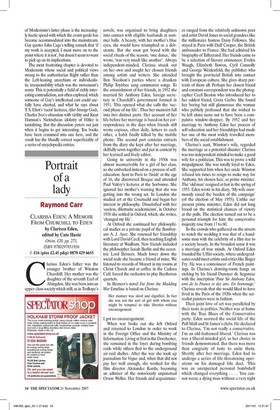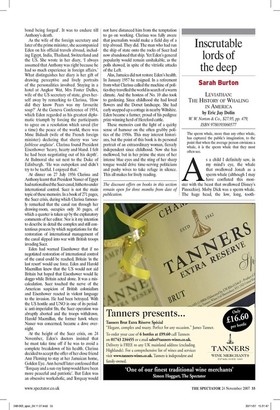Portrait of a lady
Raymond Carr CLARISSA EDEN: A MEMOIR FROM CHURCHILL TO EDEN by Clarissa Eden, edited by Cate Haste Orion, £20, pp. 271, ISBN 9780297851936 £16 (plus £2.45 p&p) 0870 429 6655 Clarissa Eden's father was the younger brother of Winston Churchill. Her mother was the daughter of the seventh Earl of Abingdon. She was born into an upper-class society which still, as in Trollope's novels, was organised to bring daughters into contact with eligible husbands at summer balls. A beauty, with her mother's blue eyes, she would have triumphed as a debutante. But she soon got bored with the social rituals of the season; 'one dance,' she wrote, 'was very much like another'. Always independent-minded, Clarissa struck out on her own and sought her chosen friends among artists and writers. She attended Ben Nicolson's parties where a drunken Philip Toynbee sang communist songs. To the astonishment of her friends, in 1952 she married Sir Anthony Eden, foreign secretary in Churchill's government formed in 1951. This opened what she calls the 'second phase of my life'. Thus her memoirs fall into two distinct parts. Her account of her life before her marriage is based on her correspondence in the days when friends still wrote copious, often daily, letters to each other, a habit finally killed by the mobile phone. The second part contains extracts from the diary she kept after her marriage, skilfully sewn together and put in context by her learned and lively editor.
Going to university in the 1930s was almost inconceivable for a girl of her class, so she embarked instead on a process of selfeducation. Sent to Paris to 'finish' at the age of 16, she discovered Braque and attended Paul Valery's lectures at the Sorbonne. She ignored her mother's warning that she was getting into the wrong set. In London she studied art at the Courtauld and began her interest in philosophy. Dissatisfied with her 'useless, dilettante academicism', in October 1938 she settled in Oxford, which, she writes, 'changed my life'.
At Oxford she continued her philosophical studies as a private pupil of the flamboyant A. J. Ayer. She renewed her friendship with Lord David Cecil, then teaching English literature at Wadham. New friends included the philosopher Isaiah Berlin and the eccentric Lord Berners. Much lower down the social scale she became a friend of mine. We listened to records of Mozart in my rooms at Christ Church and at coffee in the Cadena Café forced the orchestra to play Beethoven quartets.
In Berners's novel Far from the Madding War Emeline is based on Clarissa: Her manner was aloof and dignified. In fact she was not the sort of girl with whom you might be tempted to take liberties without encouragement.
I got no encouragement.
When war broke out she left Oxford and returned to London in order to work in the Foreign Office and the Ministry of Information. Living at first in the Dorchester, she remained in the foyer during bombing raids while others fled to the underground air-raid shelter. After the war she took up journalism for Vogue and, when that did not pay her well enough, she worked for the film director Alexander Korda, becoming an admirer of the notoriously unpunctual Orson Welles. Her friends and acquaintances ranged from the relatively unknown poet and artist David Jones to social grandees like the millionaire hostess Daisy Fellowes. She stayed in Paris with Duff Cooper, the British ambassador to France. She had admired his biography of Talleyrand. Her friends came to be a selection of literary eminences: Evelyn Waugh, Elizabeth Bowen, Cyril Connolly and George Weidenfeld, the publisher who brought the provincial British into contact with European culture. She gives sharp portraits of them all. Perhaps her closest friend and constant correspondent was the photographer Cecil Beaton who introduced her to her oddest friend, Greta Garbo. She found her boring but still glamorous: the woman who publicly professed that she wished to be left alone turns out to have been a compulsive window-shopper. By 1952 and her marriage to Anthony Eden her process of self-education and her friendships had made her one of the most widely travelled members of the social establishment.
Clarissa's aunt, Winston's wife, regarded the marriage as a potential disaster: Clarissa was too independent-minded to make a good wife for a politician. This was to prove a wild misjudgment. She was totally loyal to Eden. She supported him when her uncle Winston refused ten times to resign to make way for Anthony, his chosen heir, as prime minister The 'old man' resigned at last in the spring of 1955. Eden wrote in his diary, 'My wife enormously eased the burden of the campaign' (of the election of May 1955). Unlike our present prime minister, Eden did not long brood on the statistical chances of victory at the polls. The election turned out to be a personal triumph for him: the conservative majority rose from 17 to 60.
To the crowds who gathered on the streets to watch the wedding it was that of a handsome man with the celebrity of a film star to a society beauty. In the broadest sense it was a marriage of true minds. At Oxford Eden founded the Uffizi society, where undergraduates could meet artists and critics like Roger Fry. He was a connoisseur of French paintings. In Clarissa's drawing-room hangs an etching by his friend Dunoyer de Segonzac with the inscription 'Pour Sir Anthony Eden, ami de la France et des arts. En hommage.' Clarissa reveals that she would liked to have lived in the Paris of the 1920s when the surrealist painters were in fashion.
Their joint love of art was paralleled by their taste in politics. Neither was at home with the True Blues of the Conservative party. Eden scorned the social life of the Pall Mall and St James's clubs. He declared to Clarissa, `I'm not really a conservative. I'm an old-fashioned liberal.' Clarissa too was a liberal-minded girl, as her choice in friends demonstrated. But there was more than congruity of taste to unite them. Shortly after her marriage, Eden had to undergo a series of life-threatening operations on his damaged bile duct. 'This was an unexpected personal bombshell which changed everything . . . . You cannot nurse a dying man without a very tight bond being forged'. It was to endure till Anthony's death.
As the wife of the foreign secretary and later of the prime minister, she accompanied Eden on his official travels abroad, including Egypt, India, Thailand, Switzerland and the US. She wrote in her diary, 'I always assumed that Anthony was right because he had so much experience in foreign affairs.' What distinguishes her diary is her gift of drawing perceptive and lively portraits of the personalities involved. Staying in a hotel at Angkor Wat, Mrs Foster Dulles, wife of the US secretary of state, gives herself away by remarking to Clarissa, 'How did they know Pears was my favourite soap?' At the Geneva Conference of 1954, which Eden regarded as his greatest diplomatic triumph by forcing the participants to agree on a resolution which saved (for a time) the peace of the world, there was Mme Bidault (wife of the French foreign minister) declaring that sherry was `une faiblesse anglaise' . Clarissa found President Eisenhower 'heavy, hearty and bland. I felt he had been negotiating out of his depth'. At Balmoral she sat next to the Duke of Edinburgh. 'He was outspoken and didn't try to be tactful. I enjoyed that.'
At dinner on 27 July 1956 Clarissa and Anthony learnt that President Nasser of Egypt had nationalised the Suez canal, hitherto under international control. Suez is not the main topic of these memoirs. In a book of 271 pages, the Suez crisis, during which Clarissa famously remarked that the canal ran through her drawing-room, occupies only 30 pages, of which a quarter is taken up by the explanatory comments of her editor. Nor is it my intention to describe in detail the complex and still contentious process by which negotiations for the restoration of international management of the canal slipped into war with British troops invading Suez.
Eden had warned Eisenhower that if no negotiated restoration of international control of the canal could be reached, Britain 'in the last resort' would use force. Eden and Harold Macmillan knew that the US would not aid Britain but hoped that Eisenhower would lie doggo while Britain acted alone. It was a miscalculation. Suez touched the nerve of the American suspicion of British colonialism and Eisenhower reacted in violent language to the invasion. He had been betrayed. With the US hostile and UNO in one of its periodic anti-imperialist fits, the Suez operation was abruptly aborted and the troops withdrawn. Harold Macmillan, the former hawk where Nasser was concerned, became a dove overnight.
At the height of the Suez crisis, on 24 November, Eden's doctors insisted that he must take time off if he was to avoid a complete breakdown of his health. Clarissa decided to accept the offer of her close friend Ann Fleming to stay at her Jamaican home, Golden Eye. Ann herself later confessed that 'Torquay and a sun-ray lamp would have been more peaceful and patriotic'. But Eden was an obsessive workaholic, and Torquay would not have distanced him from the temptation to go on working. Clarissa was fully aware that journalists would make a field day of a trip abroad. They did. The man who had run the ship of state onto the rocks of Suez had now abandoned that ship. Yet Eden's general popularity would remain unshakable, as the polls showed, in spite of the vitriolic attacks of the Left.
Alas, Jamaica did not restore Eden's health. In January 1957 he resigned. In a retirement from what Clarissa called the machine of politics they travelled the world in search of a warm climate. And the hostess of No. 10 also took to gardening. Since childhood she had loved flowers and the Dorset landscape. She had early snapped up a cottage in nearby Wiltshire. Eden became a farmer, proud of his pedigree prize-winning herd of Hereford cattle.
These memoirs cast the light of a quirky sense of humour on the often grubby politics of the 1950s. This may interest historians, but the point of this book is its personal portrait of an extraordinary woman, fiercely independent since childhood. Now she has mellowed, but in her prime the stare of her intense blue eyes and the sting of her sharp tongue would drive time-serving politicians and pushy wives to take refuge in silence. This all makes for lively reading.
The discount offers on books in this section remain open for three months from date of publication.







































































 Previous page
Previous page